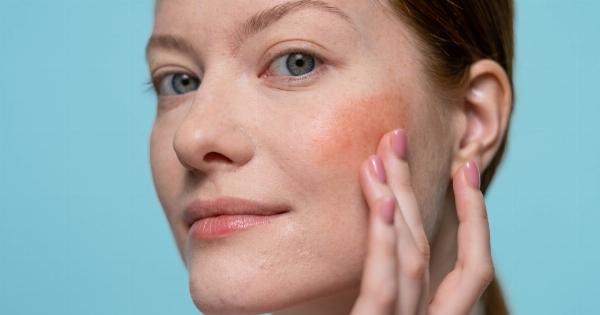Have you ever noticed that you seem to bruise easily and frequently, even from the slightest touch or bump? If so, you may be wondering what could be causing this tendency to bruise so easily.
While occasional bruising is a normal part of life, persistent or excessive bruising can be a cause for concern and may indicate an underlying health issue. In this article, we will explore some of the hidden causes of frequent bruising and what you can do about it.
1. Vitamin Deficiencies
One possible hidden cause of frequent bruising is a deficiency in certain vitamins. Vitamin C, for example, is essential for the production of collagen, a protein that helps strengthen the walls of blood vessels.
Without adequate collagen, blood vessels become fragile and prone to rupture, leading to easy bruising. Similarly, a deficiency in vitamin K can impair blood clotting, making it easier for bruises to form and take longer to heal.
To address this potential underlying cause, it’s important to ensure you’re getting enough of these vitamins through your diet or supplements. Citrus fruits, berries, broccoli, and leafy greens are all excellent sources of vitamin C.
Foods rich in vitamin K include leafy greens, Brussels sprouts, and fermented soy products like natto.
2. Medications and Supplements
Some medications and supplements can increase your risk of bruising. Blood thinners, such as aspirin, warfarin, or certain types of anti-inflammatory drugs, can interfere with the clotting process, making bruises more likely to occur.
Similarly, certain supplements like fish oil, ginkgo biloba, and garlic can also thin the blood and increase the chances of bruising.
If you suspect that your medication or supplement regimen may be contributing to your frequent bruising, it’s crucial to consult with your healthcare provider.
They can assess your situation and determine whether any adjustments need to be made to your treatment plan.
3. Aging Skin
As we age, our skin becomes thinner and loses some of its protective cushioning, making it more susceptible to bruising. The fatty layer that helps cushion our blood vessels decreases with age, leaving blood vessels closer to the surface of the skin.
This proximity to the skin’s surface makes them more vulnerable to injury and subsequent bruising.
While the natural aging process is inevitable, there are steps you can take to protect your skin and minimize the likelihood of bruises.
Wearing long sleeves or protective clothing when engaging in activities that may cause trauma to the skin can help reduce the risk. Additionally, using moisturizers regularly can improve the skin’s overall health and elasticity, making it more resilient.
4. Blood Disorders
Underlying blood disorders can also contribute to frequent bruising. Conditions such as hemophilia, von Willebrand disease, or thrombocytopenia (low platelet count) can impair the blood’s ability to clot properly, leading to increased bruising.
In some cases, these disorders may also cause spontaneous bleeding without any apparent injury.
If you suspect that a blood disorder may be the cause of your frequent bruising, it is crucial to seek medical attention promptly.
A healthcare professional will be able to conduct the necessary tests to diagnose or rule out any blood disorders and develop an appropriate treatment plan.
5. Sun Damage
Prolonged sun exposure can weaken the collagen in your skin, making it more prone to bruising. UVA and UVB rays from the sun can damage the blood vessels near the skin’s surface, making them more fragile and easily susceptible to bruising.
To protect your skin from sun damage, make sure to wear sunscreen with a high SPF, even on cloudy days. Wearing protective clothing, such as hats and long sleeves, can also provide an additional layer of defense against the sun’s harmful rays.
6. Genetics
In some cases, frequent bruising may simply be a result of genetic factors. Some individuals naturally have thinner skin or more delicate blood vessels, making them predisposed to bruising easily.
While there may not be a specific treatment for genetic factors, understanding their role can help you take preventative measures and be aware of your body’s limitations.
7. Hormonal Changes
Hormonal changes in women, particularly during pregnancy or menopause, can lead to increased bruising. These changes can affect blood vessel integrity and the blood clotting process.
Fluctuating hormone levels make blood vessels more fragile and prone to rupture, resulting in frequent bruising.
If hormonal changes are the suspected cause of your frequent bruising, consulting with a healthcare professional is advisable. They can provide guidance on managing hormonal imbalances and suggest measures to minimize bruising.
8. Excessive Alcohol Consumption
Excessive alcohol consumption can interfere with the body’s normal clotting process and increase the likelihood of bruising.
Alcohol can impair the liver’s ability to produce clotting factors, leading to prolonged bleeding and more visible bruises.
Limiting your alcohol intake and consuming alcohol in moderation can help minimize this risk.
It’s important to remember that excessive alcohol consumption can have various detrimental effects on your overall health, so practicing moderation is advisable.
9. Chronic Illnesses
Some chronic illnesses, such as liver disease, kidney disease, or certain autoimmune disorders, can have an impact on blood clotting and overall blood vessel health. These conditions can make bruising more prevalent and take longer to heal.
If you have a chronic illness and are experiencing frequent bruising, it is crucial to work closely with your healthcare team to manage your condition effectively.
They may recommend specific treatments or lifestyle modifications to help alleviate your symptoms and improve your overall health.
10. Unexplained Bruising
In some cases, persistent bruising may not have an apparent underlying cause. It’s essential to be mindful of any unusual or concerning symptoms accompanying your bruising, as they may warrant further medical investigation.
If you notice additional symptoms such as unexplained weight loss, fatigue, prolonged bleeding, or significant pain accompanying your bruising, it is crucial to consult with a healthcare professional.
They can assess your symptoms, order necessary tests, and provide an accurate diagnosis.






























